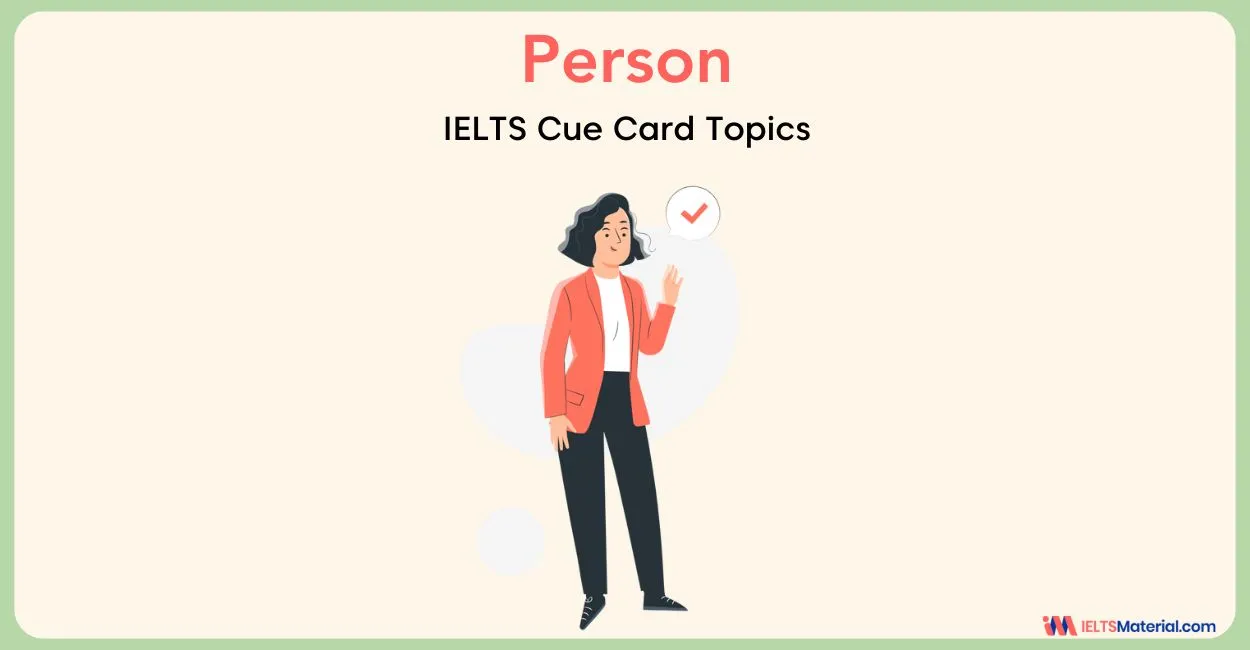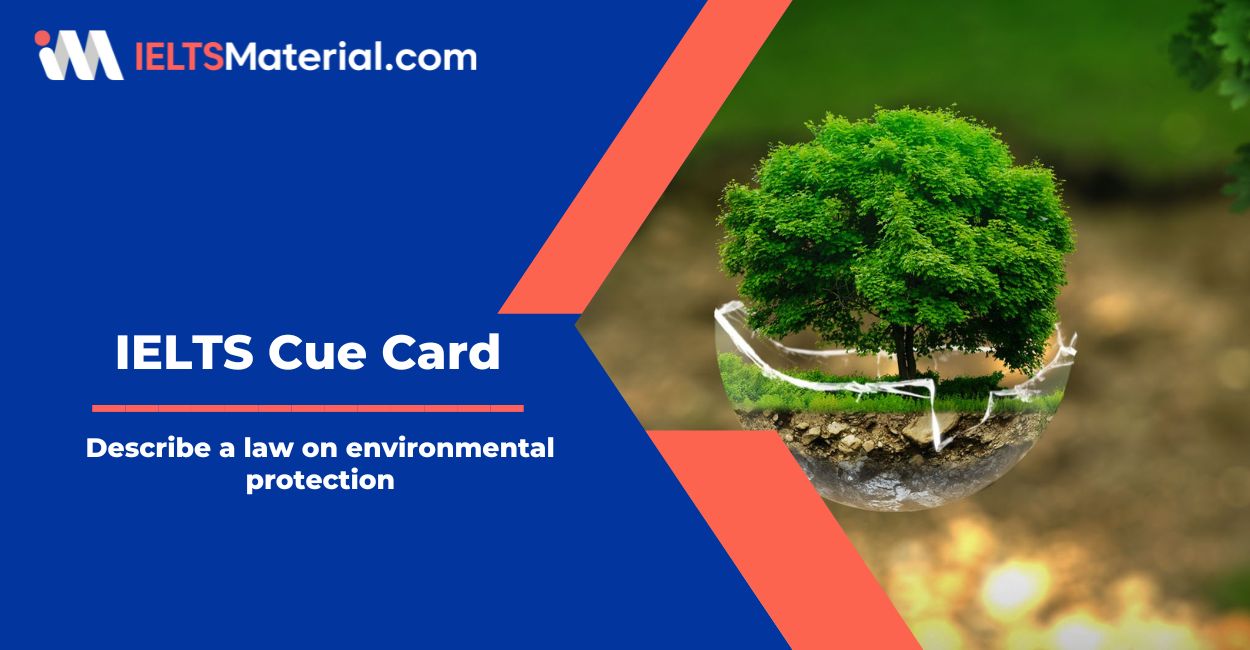Describe a law on environmental protection – IELTS Cue Card Sample Answers
Table of Contents

Limited-Time Offer : Access a FREE 10-Day IELTS Study Plan!
This article contains the Describe a law on environmental protection Cue Card Sample Answers.
During Part 2 of the IELTS Speaking test, you will have exactly one minute to prepare and speak on a specific topic. This is the IELTS cue card task. You can learn how to communicate clearly and successfully by reviewing sample answers.
This IELTS cue card gives you an opportunity to share one of your opinions on a law on environmental protection.
Practise IELTS Speaking Part 2 by referencing the Cue Card Sample Answers below.
Before you start, take a look at the expert tips and tricks below!
EMBED
Check more Your Country – Cue Cards.
For more Cue Cards, take a look at IELTS Speaking Part 2 | Topics, Questions and Samples Answers.
Describe a change that you think would improve your local area.
You should say:
- what local area
- what change
- how the change could be made
- and explain how this change would be an improvement to your local area.
Describe a law on environmental protection.
You should say:
- what the law would be about
- how the law would work
- what effects this law would have (= what changes would result from this law)
- and explain why you would like to see this law in existence or why you think this law is needed.
Sample Answer 1
In today’s contemporary epoch, the concern for the environment has increased due to the growing awareness in this domain. So, the government should consider the need of the hour and introduce environmental protection laws to conserve mother nature.
- what the law would be about
Mother Earth is deteriorating, and if this trend continues, future generations will find it impossible to live in a safe environment. I’d suggest the government introduce a law regarding the blanket ban on plastic bags, which I think would be the most effective way to protect the environment because the usage of plastic bags is a threat to human and animal life in the ecosystem.
- how the law would work
- what effects this law would have (= what changes would result from this law)
Although the government has levied heavy taxes on plastic bags, it’s not of much use. So, a law stating the complete ban on plastic bags should be introduced. As per that law, consumers can use jute bags, PP bags, canvas bags or reusable bags to replace plastic bags. The use of biodegradable bags and the prohibition of plastic bags will positively impact the environment. For instance, there will be less pollution, no floating plastics in the water, less rubbish in the streams, and less litter on the roads.
- and explain why you would like to see this law in existence or why you think this law is needed.
Implementing this law will be a blessing for every nature lover and for those who want to conserve the environment. With the stringent ban on plastic bags, the environment will be less polluted and cleaner. Every small effort of human beings will bring in a lot of difference in the environment, and I firmly believe that this law will bring an exemplary difference in everyone’s life.
Sample Answer 2
Click on the audio to listen to the sample answer above. Pay attention to the intonation and pronunciation of the words
Unlock Audio
Signup/Login and get access to the audio
- what the law would be about
I was born and raised in Hanoi and have been here for 27 years. I have watched the city develop from a small town and grow into a modern metropolitan area in the new era. With the skyrocketing population of recent years, the city’s environment has become significantly polluted. As a result, I think environmental laws should be enacted immediately to solve this problem.
- how the law would work
- what effects this law would have (= what changes would result from this law)
First of all, Hanoi’s mayor should consider putting more trash bins out in the streets so that people won’t throw rubbish anywhere anytime. Furthermore, the city police should heavily fine those who are caught littering the streets. By doing so, not only could we save a lot of money on cleaning costs but we could also improve the surrounding public scenery.
- and explain why you would like to see this law in existence or why you think this law is needed.
Secondly, the city should run a campaign to educate people on how to classify and separate garbage before throwing it out. This is necessary because unsorted waste contributes to the pollution of underground water and the earth. In my opinion, although these above actions are minor, they would contribute to diminishing the impacts of pollution in our local area if they were done on a collective level.
Vocabulary
- Born and raised in: To describe that you were born in a certain place and that you grew up there with your parents;
Eg: He was born and raised in New York but moved to California when he was 35. - Skyrocketing: Increasing, to describe when something goes up rapidly by a lot;
Eg: The skyrocketing airline prices have hurt the tourist towns, as fewer people are traveling. - Significantly: In a sufficiently great or important way as to be worthy of attention.
Eg: Our profit was significantly less this month than we had predicted. - Enacted: To put a law into place.
Eg: New laws have been enacted to keep people safe from gun violence. - Rubbish: Trash, garbage waste;
Eg: There is too much rubbish in this yard. Let’s clean it up! - Heavily fine: To fine someone heavily means to charge them a lot of money because they have violated a law or regulation;
Eg: The companies were heavily fined for polluting the river. - Littering: Throwing trash on the ground rather than putting it in the bin;
Eg: “Littering is against the law and you can be fined $1000. - Scenery: What you see in the natural environment; a beautiful scenery usually includes beautiful nature scenes, but ugly scenery would have trash and pollution;
Eg: The scenery in the Turkish countryside is beautiful. - Run a campaign: To organize and work on a program to reach a goal, such as a campaign to educate people about pollution or teenage pregnancy, or alcohol abuse;
Eg: He is in charge of running the campaign to save dogs in our rural areas. - To classify and separate: In the context of recycling, to classify means to figure out what bin each item belongs in, such as glass, plastic, paper, and then to put them into the appropriate bins;
Eg: He is lazy and does‟t like to classify and separate his garbage. - To throw something out: To get rid of something; to put it in the trash;
Eg: My mother threw out all my boyfriend’s old letters. - Unsorted: Not separated;
Eg: The shirts were unsorted, so all the colors were mixed together and it made it hard to find all the red ones. - Minor: Small or insignificant;
Eg: We had a minor accident in our car today. - Diminishing: Going down, lessening;
Eg: The pain has been diminishing since I took the aspirin. - Impacts of: The effects of something on something else;
Eg: The impact of the storm has yet to be fully understood. - Collective level: A collective is a group of people, so in this context if you are working at a collective level, it means that people are working together to solve a problem;
Eg: This problem will only be solved if we work at it on a collective level, not an individual level.
Related Cue Cards:
Also Check :

Start Preparing for IELTS: Get Your 10-Day Study Plan Today!
Recent Articles

Haniya Yashfeen

Kasturika Samanta

Nehasri Ravishenbagam





Post your Comments